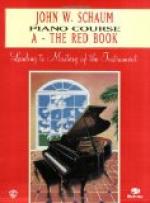“Of course I advise comprehensive scale practise; scales in all keys and in various rhythms and touches. There is an almost endless variety of ways to play scales. Those in double thirds and sixths I use later, after the others are under control. Arpeggios are also included in this scale practise.
“I have said that Concentration is the keynote of piano mastery. Another principle which goes hand in hand with it is Relaxation. Unless this condition is present in arms, wrist and shoulders, the tone will be hard and the whole performance constrained and unmusical. There is no need of having tired muscles or those that feel strained or painful. If this condition arises it is proof that there is stiffness, that relaxation has not taken place. I can sit at the piano and play forte for three hours at a time and not feel the least fatigue in hands and arms. Furthermore, the playing of one who is relaxed, who knows how to use his anatomy, will not injure the piano. We must remember the piano is a thing of joints; the action is so delicately adjusted that it moves with absolute freedom and ease. The player but adds another joint, which should equal in ease and adjustment the ones already there. On the other hand a person with stiff joints and rigid muscles, thumping ragtime on a good piano, can ruin it in a week; whereas under the fingers of a player who understands the laws of relaxation, it would last for many years.
“This principle of relaxation is exemplified in the athlete, baseball player, and others. They have poise and easy adjustment in every part of the body: they never seem to fall into strained or stiff attitudes, nor make angular or stiff movements. Arms, shoulders, wrists and fingers are all relaxed and easy. The pianist needs to study these principles as well as the athlete, I believe in physical exercises to a certain extent. Light-weight dumb-bells can be used; it is surprising how light a weight is sufficient to accomplish the result. But it must be one movement at a time, exercising one muscle at a time, and not various muscles at once.
“For memorizing piano music I can say I have no method whatever. When I know the piece technically or mechanically, I know it by heart. I really do not know when the memorizing takes place. The music is before me on the piano; I forget to turn the pages, and thus find I know the piece. In playing with orchestra I know the parts of all instruments, unless it be just a simple chord accompaniment; it would not interest me to play with orchestra and not know the music in this way. On one occasion I was engaged to play the Sgambatti concerto, which I had not played for some time. I tried it over on the piano and found I could not remember it. My first idea was to get out the score and go over it; the second was to try and recall the piece from memory. I tried the latter method, with the result that in about three hours and a half I had the whole concerto back in mind. I played the work ten days later without having once consulted the score. This goes to prove that memory must be absolute and not merely mechanical.




